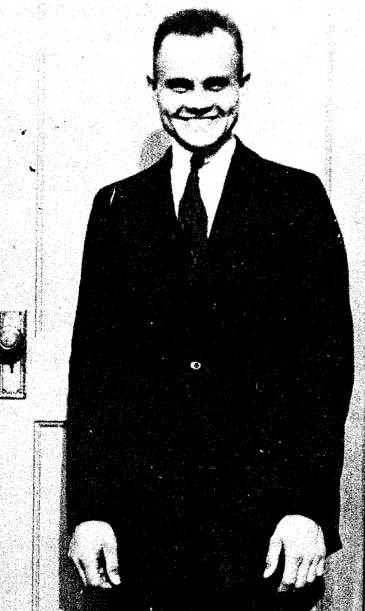Are You DRUNK Again, Peter Dyneka?

[ABOVE: Peter Dyneka, c. 1920. Baker Books, 1975. Public domain because of age.]
Peter Dyneka’s landlord noticed something different. “What’s wrong with you, Peter? Are you drunk?”
“No,” replied Peter, a big smile on his face. “I’m saved!”
That was 18 January 1920. Before then, hanging out with communist union members, Dyneka had declared himself an atheist. Now the twenty-two-year-old had stepped onto a path that would bring him and the gospel into the communist countries of Eastern Europe.
Six years earlier, on this day, 11 March 1914, he had sailed from Libau, Russia, for Nova Scotia to seek work to pay off his parents’ debts. He found a job in Chicago. By hard work and much scrimping, he managed to send home enough money in a year to save the family farm. But although a dutiful son, he knew himself to be a sinner.
Several Christian encounters began to crack his shell. He went to see a Billy Sunday evangelistic meeting and was astonished at the crowd’s affection for the preacher. The spiritual leaders he had known in Russia were feared. Attracted by the singing of Russian evangelists on Chicago’s streets, he listened to their baffling message of free forgiveness. An expatriate Russian couple extended Christian hospitality to him. Later he decided to improve his English by attending Paul Rader’s evangelistic meetings. Great was his discomfort when it seemed Rader looked directly at him and enumerated his sins. Had someone reported him to the evangelist?
But Dyneka went back for more meetings. The seed fell on good soil and Dyneka accepted Christ’s invitation. From the start, Dyneka was not a sideline Christian. He set out to gather souls, bringing them to Rader’s meetings. Despite his poor English, he studied at Moody Bible Institute and afterward graduated from St. Paul Bible School as valedictorian in 1925.
About the same time, Peter Dyneka heard from Russia. Five of his siblings had died from famine. His father’s health was failing. Dyneka felt the Lord calling him to return to Russia to share the gospel with family and friends. Although reared Orthodox, they were ignorant of Christ’s power to transform lives. He spent the night of the ninth of August in prayer, promising the Lord he would go as soon as God provided the funds. He did not have long to wait. One woman even wakened Dyneka at 6:00 a.m. one morning to hand him a sum she had made by selling her diamond ring. By the first of October, 1925, Dyneka was headed back to Russia.
He found his surviving brother had become an atheist. Dyneka’s mother would have nothing to do with him when he persisted in preaching an evangelical gospel. Others heard him gladly, however, including Vera Demidovich whom he met while on that visit to Russia. They married in 1926 and she accompanied him when he returned to America.
Back in the United States he worked among Russians expatriates, especially among farmers in the Dakotas, becoming known as “Peter Dynamite.” The All-Russian Evangelical Union sent him to Latvia and Estonia and later he headed an international outreach by Rader. In 1934, he united with a number of businessmen to found the Russian Gospel Association (later renamed the Slavic Gospel Association).
Always eager to multiply his outreach, Dyneka joined with J. Oswald Smith to found a Russian language Bible school. And he seized the opportunity to broadcast in the Russian language over shortwave radio. Many Russians heard the gospel for the first time through this radio ministry. Some pleaded with broadcasters to read the Scriptures slowly so that they, having no Bibles, could copy God’s words into notebooks.
When he died in Wheaton, Illinois, in 1987, Dyneka left a legacy of faithful service and an organization that continued under the leadership of his son, Peter Jr.
Other Events on this Day
- Years of William Carey's Work Went up in Flames
- CROWDS COULDN’T GET IN TO HEAR MENDELSSOHN’S REVIVAL OF BACH





